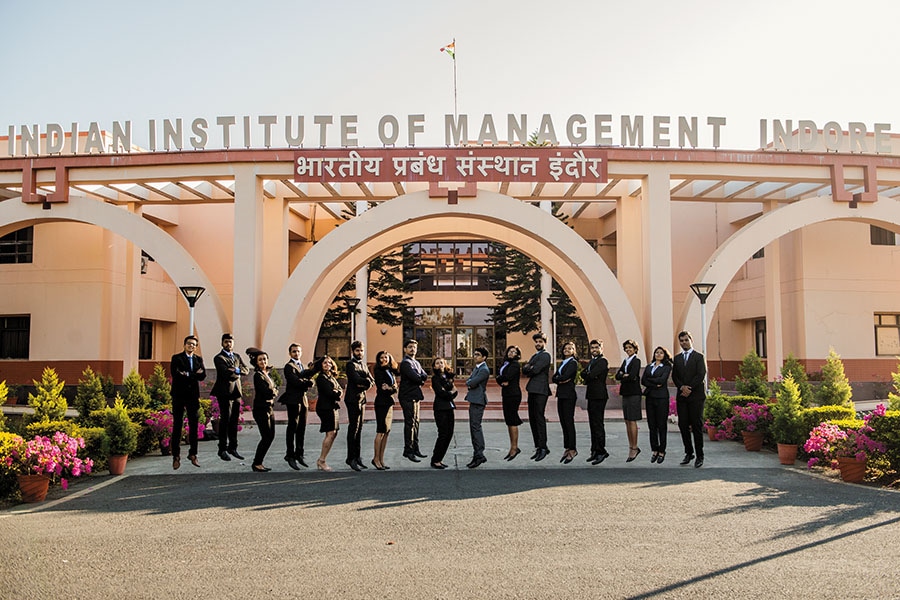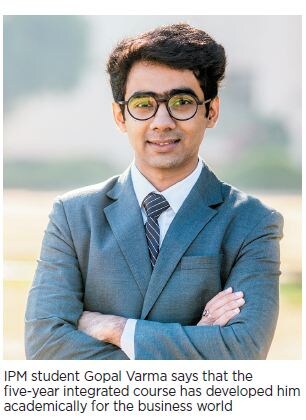Early birds: A holistic view of integrated management courses
Integrated courses that initiate the race to an MBA after class 12 may be one way to avoid the mad scramble at the post-graduate stage, but they present their own set of problems


 The Indian Institute of Management Indore introduced integrated management courses in 2011
The Indian Institute of Management Indore introduced integrated management courses in 2011
Image: Sakshi Parikh for Forbes India
Depending on which estimate you go by, there may be between 4,500 and 5,500 management institutes in the country. And we are not counting the unapproved ones. Yet, getting admission into one of these – the approved ones – is not a walk in the park. Along with the mandatory bachelor’s degree (or equivalent), you would also need work experience and have to pass an entrance test to get into an institute worth its degree.
There is another way to pursue a Master of Business Administration (MBA), for long the most coveted rung of the education ladder, which allows you to skip a few of those requirements. It is by opting for an integrated management course after class 12.
Integrated management programmes are five-year courses that have an under-graduation (UG) and a post-graduation (PG) course rolled in one. The advantage here is that the student does not have to reappear for an entrance test after UG, for the PG course. Very simply, the student enters the university after class 12, and exits with a Master’s degree after five years.
The Indian Institute of Management-Indore (IIM-Indore), established in 1996 and among the top six elite IIMs, introduced the Integrated Programme in Management (IPM) in 2011. Split into three years of UG and two years of PG, the course is designed to provide holistic and pragmatic education. Gopal Varma, a fourth year student of the IPM at IIM-Indore, explains how with an example: “To learn corporate etiquette, we were taken to a five-star restaurant for dinner so that we could learn how to behave in such an environment.”G Venkat Raman, the chair of IPM, IIM-Indore, says that the reason for launching the IPM was to diversify the mix of students in Post-Graduation Programme (PGP) classes. “The system predominantly has engineers in PG classes because of the nature of the Common Admission Test (CAT). For participative learning, we need to have students from non-engineering backgrounds.”
The focus of the foundation course - the first three years - is on the “four pillars” of the IPM: statistics, economics, mathematics and social sciences. In addition, there are humanities, literature and skill-building courses, along with an option to pursue a foreign language. The IPM also has a group of subjects called ‘bridge courses’. They comprise courses related to information technology, intellectual property rights or introduction to corporate law. “They enable our students to look at those aspects of the ecosystem that a PGP doesn’t deal deeply with,” explains Venkat Raman. IPM students also take part in a two-month social internship within a core social domain like a nonprofit, social organisation or the CSR wings of companies.
After five years, IPM students receive a Bachelor of Arts (Foundations of Management) degree along with an MBA. “We don’t call ourselves BBA [Bachelor of Business Administration], but a BA because we teach our students the foundation of what they are going to learn later. These are the courses that stem out into management and we expose them to it, at the UG level,” explains Venkat Raman.
Another prominent integrated MBA programme is offered by Mukesh Patel School of Technology Management & Engineering, a part of Narsee Monjee Institute of Management Studies. Launched in July 2015, MBA (Tech) is a five-year integrated programme that provides technical and management education. The objective is to create the much-in-demand ‘technomanager,’ or a management professional with technical knowledge. Students pass out with a BTech degree followed by an MBA in Technology Management.
The first year of the MBA (Tech) course is purely technical, while the fifth year is entirely management. The middle years provide a mix of both. Ojas Gosar, a third-year student, explains: “The general path is four years of pure technical course followed by two years of pure management course. The integrated course gives exposure to both aspects simultaneously, along with a mandatory internship program for industry experience, all within five years.”
The NIIT University (NU) in Neemrana, Rajasthan, flagged off a four-year integrated MBA programme in 2018. The first batch of the four-year, single-degree integrated course will pass out in 2022. About 69 percent of the course is designed by the university and students can decide the rest. Students can select a specialisation apart from a minor programme and an elective.
NU also has a mentorship programme, where students can learn from industry managers. Dr Sunil Khanna, vice president, NU, says: “The mentorship programme helps students understand how a typical manager’s day is.” The programme allows the student to study at the university for three and a half years followed by an industry internship experience for six months. “We found that in the industry immersion, more than 65 percent students are absorbed by the same company.” The Advantages
The Advantages
Gopal Varma, the IPM student quoted earlier, says that the first three years of the course helped him build a stronger foundation of management discipline, which, in turn, helped him perform better in his MBA.
"They developed me academically for the business world," he says.
Academicians say that integrated courses tend to shape the personality of students as holistic and hardworking individuals, as they are picked up at an age where they are entering adulthood.
Integrated courses influence early adulthood up to the 20s. Also, students doing an integrated BTech and MBA save a year. An individual BTech takes four years followed by two years of MBA, while the integrated course takes five.  The Cons
The Cons
The basic disadvantage is that an intergrated course starts early in a student’s life. Class 12 students, typically between 17 and 19, are expected to decide their career choice early in life.
Students need to make up their mind on what they want to do and where they see themselves.
What does not help is that the All India Council for Technical Education (AICTE) has banned the exit option from integrated courses, in line with the recommendation of the University Grants Commission (UGC), the apex body for all universities. AICTE Chairman Anil Sahasrabudhe explains why: “The degree-awarding authority vests with universities, and universities are bound by UGC regulations. Hence AICTE had to withdraw the exit at the end of the third and the fourth year.”
While the IIMs do not fall under the purview of the AICTE since they are governed by the IIM Act passed by the Parliament, the ban on exit options is applicable to private colleges. Students exiting integrated courses will no longer remain eligible for receiving the degrees, and will be handed a transfer certificate by the colleges.
SS Mantha, who was AICTE chairman when integrated courses were flagged off, disagrees with the ban on exits. “Preventing a student from exiting after he completes the academic requirements of a course, even if it is a part of an integrated course is not legally tenable. An exit option must always be available.”
What is more, placements for integrated courses are not a patch on those for PGPs. “There was a lot of resistance in the beginning,” says Venkat Raman. “Even today, not every company open to PGP students is open to IPM students, although, over time, industry has shown more flexibility in including them.”
First Published: Jan 11, 2019, 10:12
Subscribe Now